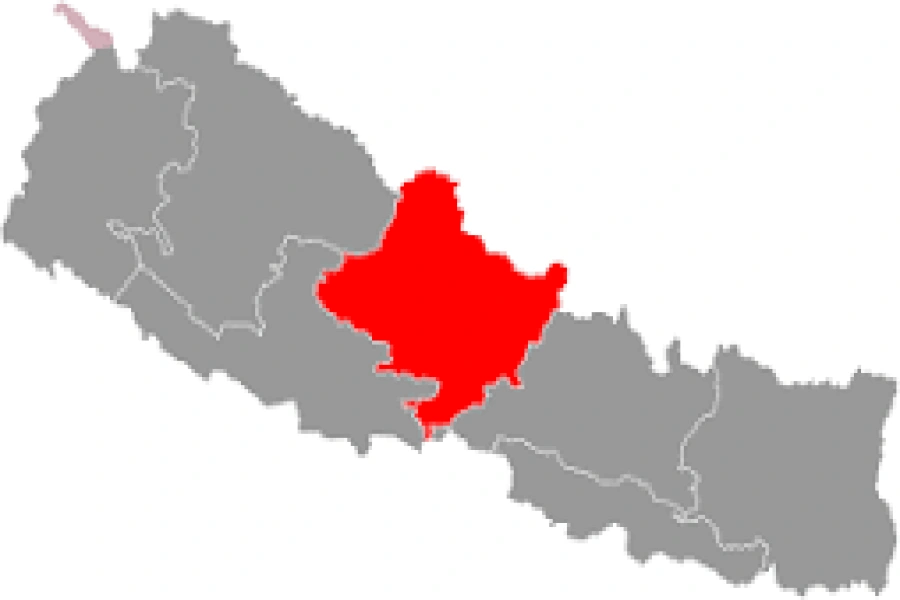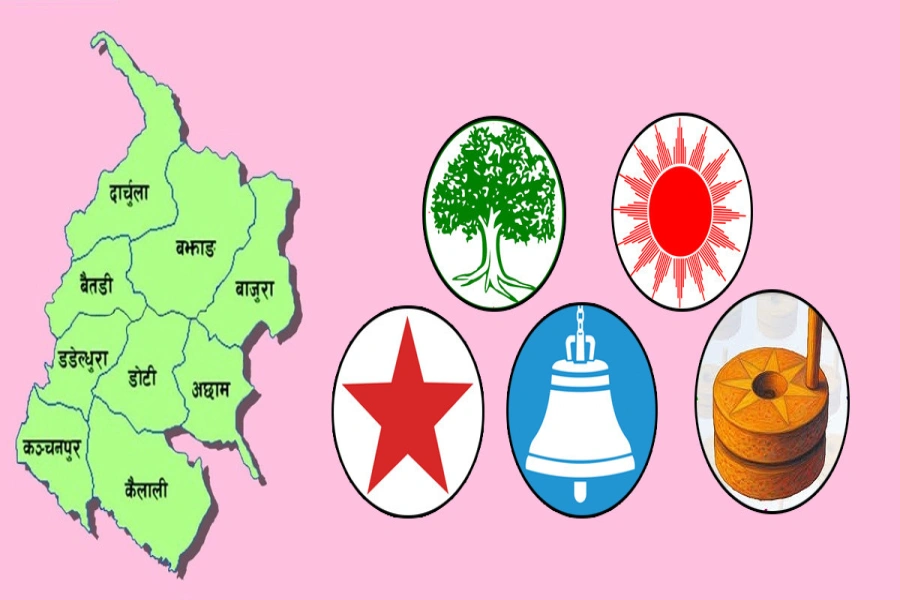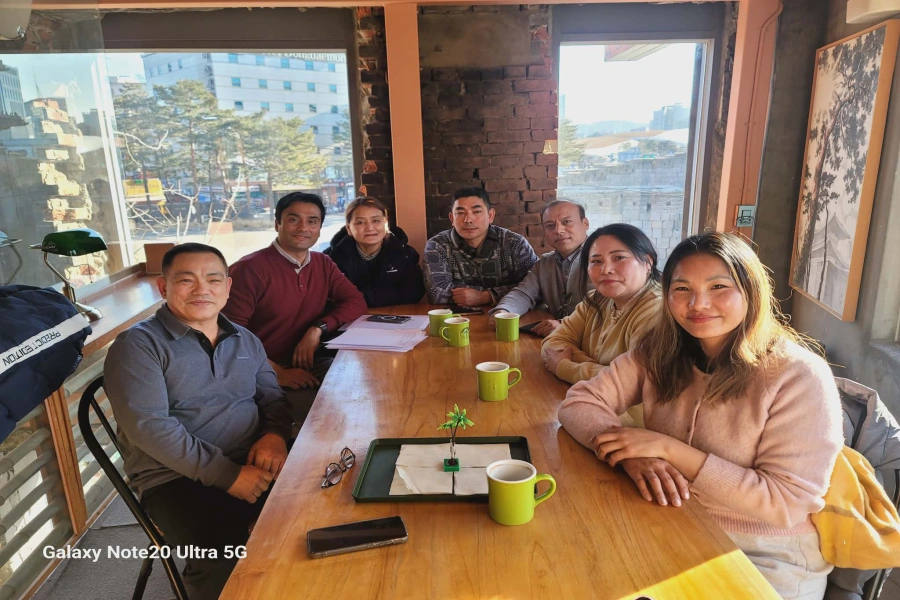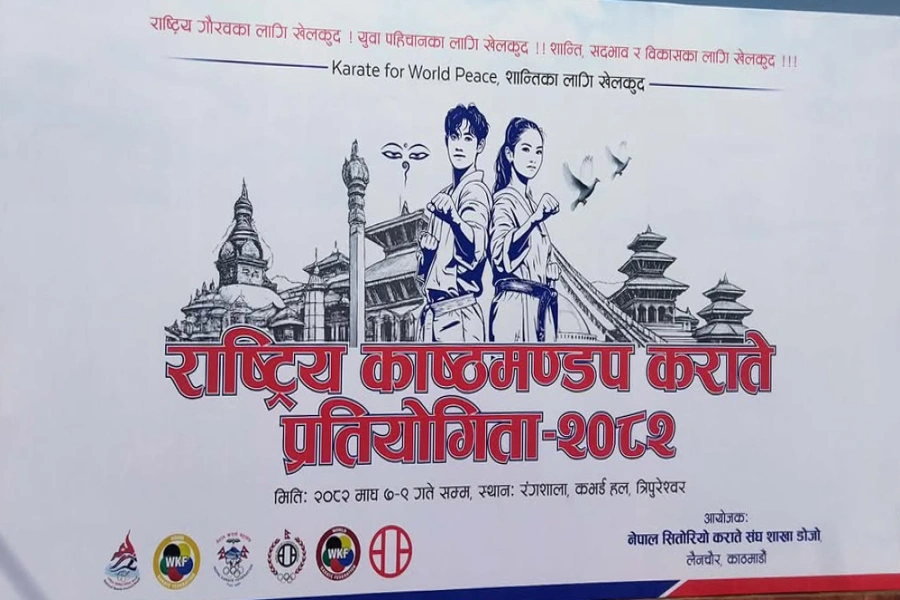Hamke piyaide bhor bhor ge!”
The appeal for Tadi as suggested by this old Maithili song is still fresh today. The lyricist calls out heartily for some Ramdulari to serve him Tadi in katiya, a certain kind of pot made of mud, and asks her to let him drink it in the early morning.[break]
Tadi is a type of drink extracted from palm species like Tadi and Khajur trees found mainly in the humid regions of the Terai. If Tadi is consumed while fresh and sweet, it has the zing of beer and is slightly intoxicating. Regular drinkers say that mature Tadi gives more kicks.
The family of Dil Muhamad Miya, 77, from Harpatgunj in Parsa has been selling Tadi for three generations. The most interesting thing is that he does not have the trees of his own and he has never drunk Tadi himself.

Photo: Ritesh Tripathi
Until a few years back, he used to work as Pasi, those people who climb palm trees to extract the juice in the traditional container called labani.
“Old age has made me lazy. Nowadays, I buy the juice from the Pasis,” he says. He adds that he did not choose to sell Tadi because it earns him good living but he started it to avoid staying idle. Now he has no intention to get rid of it. “When the season arrives, I get into the business,” he says. He also mentions that the Tadi season lasts from May to June end.
Hamid Miya, 55, who takes Dil Muhamad as his business guru, works as a pasi while running his own Tadi bar. He also does not own any trees. He has taken eight trees on lease for one season at the rate of Rs 500 per tree. He has been in the business since he was 20.
“Earlier, locals and visitors from neighboring villages used to come here to drink Tadi but now people come from even Birgunj and Simara,” he says with a sense of pride. He adds that even city people love Tadi these days.
“I can get it for lesser prices than cold drinks and it’s even good for health, so I prefer drinking Tadi in this season,” says Umesh Rawat, 20, who comes to drink it from the neighboring village of Maniyari. As he arrived at the shop despite the heat at 3 o’clock in the afternoon on his bike, he paid Rs 20 for a bottle. He drank it in two long gulps.
This was how the evening business kick-started for Hamid who had been relaxing in his shop after he sold the morning stock.

Photo: Ritesh Tripathi
“Before the clock strikes 5, there will be no space to park motorcycles or cycles here,” he says as he prepares utensils, ropes and sickle required to extract the juice.
The junction at Harpatgunj village has 10 shops that sell Tadi and more that 60 trees stand in the place. Hamid says that one tree serves 10 to 15 bottles of Tadi per day. Every other village in the Terai has such places that sell tadi.
Bharbaliya Village in Bara is also famous for tadi. Makhan Mukhiya runs a shop in the dense settlement populated by people of the Bin caste, and claims that his shop is doing very well.
However, he does not sell tadi. He only sells snacks that people love to have while drinking tadi. His two neighbors, Bhabikhan Mukhiya and Dharichan Mukhiya sell tadi, which is why snacks such as fish, beans, eggs and spicy chicken are preferred by Tadi drinkers.
“When the season arrives, people from different walks of life come here to drink tadi. People come from Feta, Kalaiya, Birgunj and Jitpur to my shop and make themselves comfortable here,” says Mukhiya, pointing to the sitting arrangement in his shop.
Sitaram Mukhiya, who is from Feta, has been selling fish to five shops at Bharbaliya and nearby Binliya. He has enough business in the village during the Tadi season who otherwise goes to the nearby market to sell his fish during off season.
“It’s good to sell fish by going around the village rather than setting up shop at the marketplace. It’s pleasurable too,” he says, adding, “Since I can drink Tadi while I’m working.”
Covering 15 trees to extract the juice, Dharichan has no time to spare. He has taken those trees on lease on the agreement with the landlord that half of the extract is to be given to the owner and half to be used for his business.
He climbs the trees early in the morning to bring the labani, the pot of the extracts which he hangs there the night before. He needs to fill the pot again in the morning.
He again climbs the trees at noon to extract the juice. Again in the evening, he fills the labani with the extracts and hangs it on every tree for the next morning.

Photo: Ritesh Tripathi
He climbs those 60-feet-tall trees with the help of only a thin rope. Tying the labani and sickle around his waist, it takes merely a minute for him to reach the top. But this method of climbing the trees is not safe. There is a popular local proverb that compares the risk of tree climbing with falling in love.
“Aisa haal he premika jaise lamba khajur, Chade so chakhe prem ras, gire to chaknachur.”
Thirty-five-year-old Dharichan started the business since his youth. But he laments that the business of selling tadi, which only lasts for two months, does not earn enough for his family of five for the whole year. “So I work in a brick kiln as soon as the season ends,” he says.
He represents the physical condition of the Pasis. The pustule on both his hands, thick skin developed on his arms and legs, burnt scars on his chest and injuries on his body are the marks of his physical stress while extracting tadi.
“People neglect those of us who work as Pasi or are involved in Tadi business. They take us as untouchables and we’re never respected for the efforts we put in,” says Dharichan.
The Tadi business has not yet been established properly, even in India, where it is produced on larger scales.
“The trend of producing sweetener from Tadi extracts in Wardha of Gujrat, which was initiated by Mahatma Gandhi, still continues,” says Dr Mankeshwornath Pandey. He also adds that the sweet dish made from the extracts of the species of Tadi in West Bengal is a must during local festivities.
“Drinking Tadi has its own health benefits due to the rich amount of fructose and other healthy constituents in it. If tuberculosis patients are served two classes of Tadi before sunrise, it can be very helpful,” he says.
However, after sunrise, Tadi starts showing its intoxicating potency. If it is stored for a couple of days, it can even be harmful to health, Dr Pandey warns. Due to the mismanagement of Tadi business, people have started to take it as an alcoholic drink taken for entertainment. Even people who sell it have not been able to give up the traditional method of selling it.
Even though useful, the Tadi business has not been able to turn into an industry.
“If Tadi could be marketed as a commercial drink, the sellers could make a nice living and drinkers would also be able to buy only genuine article,” says botany professor Dr Ramdev Tiwari, adding, “Among the palm species, the extracts from the wet palm is regarded as Tadi which contains glucose.”
Lower Tadi Hydro project begins



































